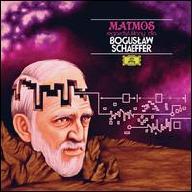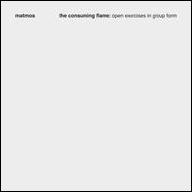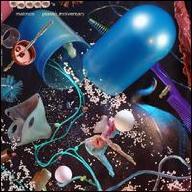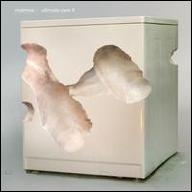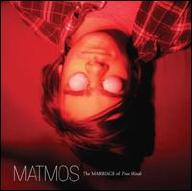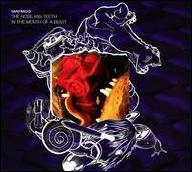Matmos began as a long-distance tape exchange project while Kentucky native Daniel (who was also affiliated with the Rodan/Rachel's precursor King G the J Crew in the early '90s) was living in London. Schmidt was a founding member of avant-garde electronic group X/I and worked with San Francisco-based experimental music collective IAO Core alongside members of groups such as Amber Asylum and Tipsy; he also co-managed the San Francisco Art Institute's New Genres department. Daniel and Schmidt developed their romantic and creative partnership, and self-released 1994's In Lo-Fidelity, a collection of chopped-up 8-bit samples, on cassette. The pair settled in the City by the Bay as Daniel pursued his Ph.D. Matmos' 1997 self-titled debut album, which they released on their own Vague Terrain label, included the nerve activity of a crayfish among its source material for its permutations of IDM. On 1998's Quasi-Objects, Schmidt and Daniel reconfigured recordings of ordinary sounds and objects, while the following year's The West transformed acoustic instruments ranging from violin to Jew's harp into bubbling electro-funk.
Following The West's acclaim, Matmos signed to Matador Records, where they released 2001's A Chance to Cut Is a Chance to Cure. Featuring samples from plastic surgeries as well as other medical procedures, the album's ambition and dark sense of humor earned the duo more favorable reviews. For 2003's The Civil War, Matmos took inspiration from medieval music and 19th century American folk, incorporating acoustic instruments like drums, brass, and a hurdy-gurdy into their politically minded compositions. The following year, the duo further reconfigured samples from the A Chance to Cut Is a Chance to Cure sessions on Rat Relocation Program. During this time, Matmos also worked with Björk on her albums Vespertine and Medúlla and on live dates. She returned the favor by appearing on their 2006 album The Rose Has Teeth in the Mouth of a Beast, a collection of "audio portraits" of influential gay and lesbian figures that also included cameos by Antony of Antony and the Johnsons and Kalonica McQuesten.
After relocating to Baltimore, Daniel and Schmidt moved in a purely electronic direction for 2008's The Supreme Balloon, an homage to the electronic pop of the '60s, '70s, and '80s that featured vintage synthesizers as well as contributions from Sun Ra Arkestra's Marshall Allen and Keith Fullerton Whitman. That year, they also worked with Lesser and Wobbly on a series of improvised recordings made for Hollow Earth Internet Radio that ultimately became the 2010 album Simultaneous Quodlibet, then worked with So Percussion on that year's Treasure State. The duo contributed remixes to Jefferson Friedman: Quartets as performed by the Chiara String Quartet in 2011. While working on these projects, Matmos also conducted parapsychological experiments that became the foundation for 2012's The Ganzfeld EP and the following year's full-length The Marriage of True Minds, both of which were released by Thrill Jockey.
For 2016's Ultimate Care II, Schmidt and Daniel went back to basics by sampling sounds from their washing machine and augmenting them with contributions from Dan Deacon, Half Japanese's Jason Willett, and members of Horse Lords. Three years later, Matmos returned with Plastic Anniversary, a set of tracks crafted out of recordings of objects ranging from poker chips to garbage containers. Featuring collaborations with a high school marching band, Deerhoof's Greg Saunier, and Drugdealer's Brooks Kossover, the album's March 2019 release coincided with Matmos' -- and Daniel and Schmidt's -- 25th anniversary. The following August, they issued The Consuming Flame: Open Exercises in Group Form, an ambitious three-hour work fashioned from source material from 99 contributors that included Oneohtrix Point Never, Herbert, Yo La Tengo, and David Grubbs, as well as Schmidt's former students at the San Francisco Art Institute and Internet forum members.
Matmos' next album found them sampling and recombining the music of Polish composer, theoretician, critic, and playwright Boguslaw Schaeffer with live instrumentation from harpist Úna Monaghan, multi-instrumentalist Ulas Kurugullu, and Horse Lords' Max Eilbacher. Commissioned by the Instytutu Adama Mickiewicza, May 2022's Regards / Uklony dla Boguslaw Schaeffer touched on styles ranging from dub to glitch to dark ambient in its collages. ~ Heather Phares & Sean Cooper, Rovi


